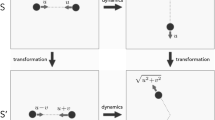Abstract
The debate concerning the relations between matter and motion has the same age as philosophy itself. In modern times this problem was transformed into the one concerning the relations between mass and energy. Newton identified mass with matter. Classical thermodynamics brought this conception to its logical conclusion, establishing an ontic dichotomy between mass-matter and energy. On the basis of this pre-relativistic conception, Einstein's famous equation has been interpreted as a relation of equivalence between mass-matter and energy. Nevertheless, if we reject this epistemologically illegitimate identification, it is possible to elaborate a unitary conception of matter, which at the same time is an argument for the unity between matter and motion. In particular, the classical antithesis between matter and field becomes obsolete in the frame of the proposed interpretation.
Similar content being viewed by others
References and notes
J. S. Bell, inThe Physicist's Conception of Nature, J. Mehra, ed. (Reidel, Dordrecht, 1973).
J. S. Bell, “Beables for quantum field theory,” Preprint, CERN-TH.4035, p. 84.
W. Heisenberg,Physics and Philosophy (George Allen & Unwin, London 1958), p. 160.
W. Heisenberg, inNiels Bohr and the Development of Physics, W. Pauli ed. (Pergamon Press, New York, 1953).
See H. Diels and W. Kranz,Die Fragmente der Vorsokratiker (Weidmannische Verlag-Buchhandlung, 1965).
Ibid. See also Y. Battistini,Trois contemporains (Gallimard, Paris, 1965), pp. 90–94. Also Aristotle,Metaphysics I, 5, 986.
For the ontology of Plato, see his Dialogues:Timaeus, Theaetetus, andParmenides.
See Aristotle,Physics, Id.,Metaphysics.
For a general treatment of early Greek philosophy, see the classical books: G. S. Kirk and J. E. Raven,The Presocratic Philosophers (Cambridge University Press, Cambridge, 1957);
J. Burnet,Early Greek Philosophy (A. and C. Black, London, 1975). For a critical review of the conceptions about nature in ancient Greek philosophy, see E. Bitsakis,Scientia 109, 664 (1974).
See R. Descartes,Principes de la Philosophie (Vrin, Paris, 1971), Part 2.
Ibid. See
A. Mercier, H.-J. Treder, and W. Yourgrau,On General Relativity (Akademie-Verlag, Berlin, 1979).
I. Newton,Opticks (Dover, New York, 1952), p. 400.
I. Newton,Mathematical Principles of Natural Philosophy (University of California Press, Berkeley, 1947),Definitions andScholium.
Ibid., Defs. I and II.
Ibid., Def. III.
I. Newton,Opticks, op. cit. ( p. 401.
See S. Carnot,Reflections of the Motive Power of Fire (Dover, New York, 1960).
See Chr. Huygens,Treatise on Light (Dover, New York, 1962). This treatise was written in 1670. The preface of the first edition was written in 1690.
A. Einstein, Préface, in I. Newton,Opticks, op. cit. (
A. Einstein,Ideas and Opinions (Crown, New York, 1982), pp. 348, 351.
E. Mach,The Science of Mechanics (Open Court, Evanston, Illinois, 1960).
Ibid., p. 237.
E. Mach,The Analysis of Sensations (Dover, New York, 1959), p. 331.
A. Einstein, in A. Einsteinet al., The Principle of Relativity (Dover, New York, 1923), p. 7.
A. Einstein,La théorie de la relativité restreinte et générale (Gauthier-Villars, Paris, 1978), pp. 51–52.
A. Einstein,Ideas and Opinions, op. cit., ( p. 337.
A. Einstein, in: A. Einsteinet al., The Principle of Relativity, op. cit., ( p. 148.
W. Heisenberg,Physics and Philosophy, op. cit., ( p. 67.
P. Teilhard de Chardin,Le Phénomène Humain (Seuil, Paris, 1962), p. 268.
For the relations between the actual and the potential in microphysics, see E. Bitsakis,Scientia 117, 539 (1982).
For the status of the philosophical propositions, see E. Bitsakis inFilosophia e Storia in Italia nel Novecento, F. Minazzi and L. Zauzi, eds. (Milano, 1987). The principle of indestructibility of matter was for the first time formulated by Democritus.
See A. Einstein, “Autobiographical Notes,” inAlbert Einstein, Philosopher-Scientist, P. A. Schilpp, ed. (Open Court, Evanston, Illinois, 1951).
See Y. P. Terletski,Paradoxes in Relativity (Plenum, New York, 1968), pp. 60–61.
A. Einstein, in A. Einsteinet al., The Principle of Relativity, op. cit., ( pp. 143 and 149.
For a detailed descussion of the preceding questions, see: E. Bitsakis,Le Problème du Déterminisme en Physique, Thèse d'État, Paris, 1976;
Y. P. Terletski,Paradoxes in Relativity, op. cit. (.
See, e.g., J. P. Terletski,Paradoxes in Relativity, op. cit.
See A. Papapetrou,Lectures on General Relativity (Reidel, Dordrecht, 1974), p. 55.
E. Einstein,La théorie de la relativité restreinte et générale, op. cit., p. 72.
A. Mercieret al., On General Relativity, op. cit., ( pp. 84–85.
A. Einstein, in A. Einsteinet al., The Principle of Relativity, op. cit., ( p. 99.
Author information
Authors and Affiliations
Rights and permissions
About this article
Cite this article
Bitsakis, E. Mass, matter, and energy. A relativistic approach. Found Phys 21, 63–81 (1991). https://doi.org/10.1007/BF01883563
Received:
Issue Date:
DOI: https://doi.org/10.1007/BF01883563




